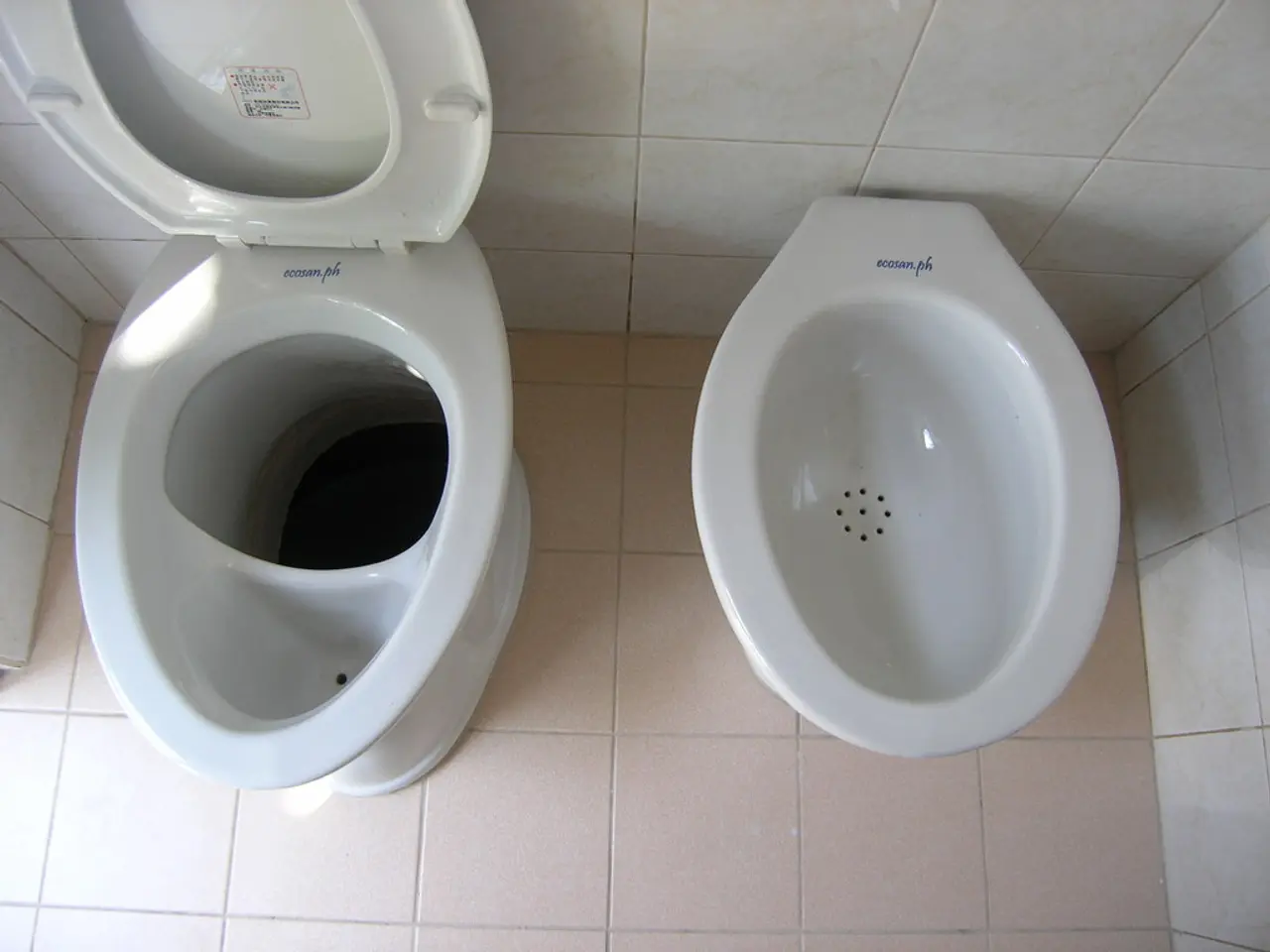Coughing-induced urine leakage: Is it usual?
Stress urinary incontinence (SUI), the most common form of urinary incontinence, affects many individuals, particularly women. SUI is characterised by involuntary urine leakage during activities that increase abdominal pressure, such as coughing, sneezing, or exercising [1][2][4].
### Common Causes
The primary causes of SUI are weakening of the pelvic floor muscles, often due to childbirth, pregnancy, or menopause [1][2]. Additionally, loss of support at the bladder neck, obesity, urinary tract infections, and hormonal changes can contribute to SUI [1][2][5].
### Symptoms
SUI is often marked by urine leakage during sudden physical stress, such as sneezing, coughing, laughing, jumping, or lifting heavy objects, without a prior urge to urinate [1][2][4]. Unlike urge incontinence, SUI does not typically involve a sudden need to urinate [3].
### Treatment Options
#### Conservative Treatments
The most common non-surgical method for treating SUI is strengthening the pelvic floor muscles through exercises like Kegels or physical therapy [1][2]. Lifestyle modifications, such as maintaining a healthy weight and avoiding bladder irritants, can also help reduce symptoms [1]. Incontinence products, pessary devices, and vaginal cones may be used to manage symptoms [1].
#### Medical and Surgical Treatments
In severe cases, midurethral sling surgery, where a small mesh sling is placed beneath the urethra to provide support, may be considered [1][3][5]. For postmenopausal women, local vaginal estrogen can improve tissue health and reduce symptoms [5]. Medications, primarily used for urge incontinence, may be considered if mixed symptoms exist [5].
### Summary Table
| Aspect | Details | |-------------------|-------------------------------------------------------| | **Causes** | Childbirth, menopause, weak pelvic floor muscles, obesity, UTIs | | **Symptoms** | Leakage with coughing, sneezing, laughing, lifting; no prior urge | | **First-line Treatments** | Pelvic floor exercises, physical therapy, lifestyle changes, incontinence products | | **Advanced Treatments** | Midurethral sling surgery, pessaries, vaginal estrogen therapy |
Patients are encouraged to seek medical advice for SUI, as it is a common and treatable condition [1][2][3]. Medications like duloxetine can help urethra muscles to contract better, helping to manage symptoms [6]. Diagnostic procedures, such as physical examinations, urine tests, and bladder function tests, may be conducted [7]. Electrical stimulation, biofeedback, and lifestyle changes may also be included in treatment to help strengthen the pelvic muscles [8].
Risk factors for SUI include being female, being 40 years of age or more, long-term coughing, obesity, smoking, pregnancy, constipation, consuming too much alcohol or caffeine, previous surgery in the region of the pelvis, and certain medications [9]. Lifestyle changes, such as losing weight, changing drinking habits, quitting smoking, and certain surgeries, could help reduce the risk factors linked to SUI [9].
References: [1] https://www.nhs.uk/conditions/stress-incontinence/ [2] https://www.mayoclinic.org/diseases-conditions/stress-incontinence/symptoms-causes/syc-20355350 [3] https://www.niddk.nih.gov/health-information/urologic-diseases/stress-incontinence [4] https://www.webmd.com/women/stress-incontinence [5] https://www.ncbi.nlm.nih.gov/books/NBK279341/ [6] https://www.nhs.uk/medicines/duloxetine/ [7] https://www.nhs.uk/conditions/stress-incontinence/diagnosis/ [8] https://www.webmd.com/women/stress-incontinence/stress-incontinence-treatment [9] https://www.nhs.uk/conditions/stress-incontinence/causes/
- Certain chronic diseases, such as Crohn's, obesity, and HIV, can increase the risk of developing SUI due to their effects on the body.
- Science has advanced to develop predictive models for determining an individual's susceptibility to SUI based on their medical history and lifestyle factors.
- Depression and mental health issues often co-occur with SUI, and addressing both conditions can lead to improved overall health and wellness.
- Asthma, a common respiratory condition, can sometimes cause coughing episodes that lead to SUI.
- Men's health is also affected by SUI, although it is more commonly associated with women.
- During pregnancy, the weight of the growing fetus can put pressure on the pelvic muscles, increasing the risk of SUI.
- Hepatitis, a liver infection, can affect various aspects of health, including digestive health and overall immunity.
- Science continues to explore the relationship between autoimmune disorders, like rheumatoid arthritis, and the development of SUI.
- Skin care is essential for maintaining optimal health, as skin conditions, such as eczema or psoriasis, can affect the pelvic area and exacerbate SUI symptoms.
- Workplace wellness programs can provide resources and support for individuals dealing with SUI, helping them stay active and manage their symptoms effectively.
- CBD oil is being studied for its potential role in managing chronic pain related to SUI, as it interacts with the body's endocannabinoid system.
- Eye health is a vital component of overall health, as vision problems can lead to difficulties in detecting and managing SUI symptoms.
- Hearing loss can create challenges when seeking medical advice for SUI, as communication with healthcare providers is crucial for accurate diagnosis and effective treatment.
- Fitness and exercise, when done correctly, can help strengthen the pelvic floor muscles and reduce the symptoms of SUI.
- Nutrition plays a significant role in managing chronic diseases, such as chronic kidney disease and diabetes, which can contribute to the development of SUI.
- Women's health encompasses various aspects, including reproductive health, menstrual issues, and continence problems like SUI.
- Therapies and treatments for SUI may include medications, surgeries, and non-invasive techniques like electrical stimulation and biofeedback.








